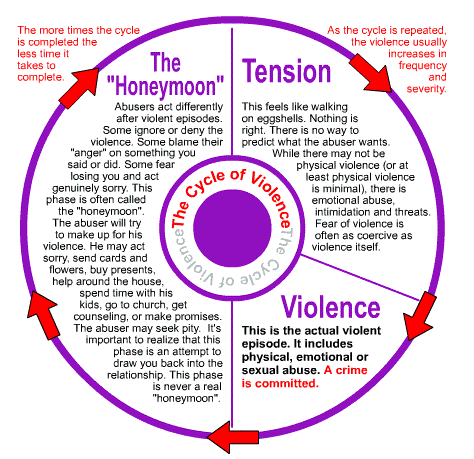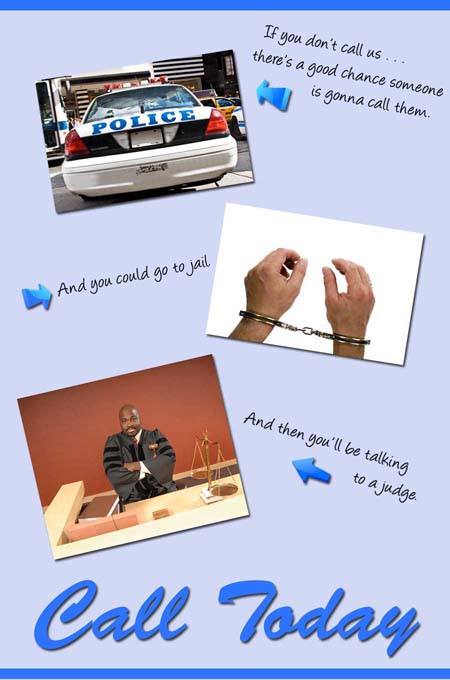INTIMATE RELATIONSHIPS
CYCLE OF VIOLENCE

Domestic violence is a cycle. It does not take place in a moment. It goes through phases as shown by the diagram above.Domestic violence starts by build-up tension in homes. This can happen from a number of reasons – financial crises, family pressure, stress from work etc. and it is carried out in a fit of rage. After the abuse, the perpetrator enters into a stage of remorse and tries to buy back the victim. The perpetrator does this through flattering words, giving of gift and money.One thing you must take note of, is that anybody who claims to love you will not assault or abuse you in any circumstance. Your loved one is supposed to protect you. So do not let your abuser buy you back. If you think you love your abuser and cannot report him/her to the authorities, then call New Solutions.
WE CAN HELP THE ABUSER.
Call Before It Is Too Late: 85% of batterers participating in BIPP programs are referred by the legal system; 15% of batterers come on their own accord.
Don’t wait to be one of the 85%.

DOES YOUR PARTNER:
- Tell you jealousy is a sign of love?
- Have an inability to cope with stress and shows a lack of impulse control? (This may not necessarily appear outside the home.)
- Have a poor self-image and blames others for problems?
- Show severe mood swings?
- Have a history of abuse in his/her own family may have been abusive in courtship?
- Limit what you do and where you can go?
- Try to control your money?
- Insult you in public and in private?
- Frequently accuse you of having affairs?
- Become violent with children, property, or pets?
- Shove, slap, punch, or kick you? Even once?
- Blame you for the abuse?
- Put down your friends and family?
- Destroy your belongings?
- Threaten to hurt you, your family members or pets?
- Tell you your fears about the relationship aren’t real?
DO YOU:
- Feel like you’re walking on eggshells to keep the peace?
- Feel like a prisoner in your home?
- Feel controlled and monitored?
- Feel powerless to make your own choices, have your own opinions, or come and go as you wish?
- Have sex when you don’t want to?
- Feel you are losing confidence in yourself?
- Feel different from other people?
- Feel your relationship is unhealthy?
- Feel powerless and victimized?
- Feel that there is something wrong with you inside?
- Have a hard time taking care of yourself, even though you care for others?
- Find it difficult to trust people?
- Feel powerless and victimized?
- Feel lonely and isolated?
- Feel used?
- Worry about your children’s safety?
- Feel satisfied with family relationships?
- Feel afraid to say “No” to his/her requests?
YOUNG WOMEN’S ABUSIVE RELATIONSHIPS GROUP
This group addresses the issues of teen females who are or have been in a dating relationship which is physically violent or emotionally abusive.

TOPICS INCLUDE:
- Identifying power and control (different types of power over victims in an effort to control them)
- Identifying the different types of abuse
- The Continuum of Violence
- Characteristics of a Batterer
- Identifying the Cycle of Violence
- What are the Effects of Battering
- Overcoming the Effects of Battering (increasing self-esteem and ceasing self-destructive behaviors)
DID YOU KNOW?
- About one in three high school students have or will be involved in an abusive relationship.
- In abusive relationships between boyfriends and girlfriends, 95% of the time it’s a boyfriend abusing a girlfriend.
- 40% of teenage girls ages 14 to 17 say they know someone their age who has been hit or beaten by a boyfriend.
- Women ages 16 to 24 experience the highest per capita rates of intimate violence-nearly 20 per 1000 women.
- 7% of all murder victims are young women.
CORPORATE MYTH-MANAGEMENT

Myth: We don’t need to train our staff about domestic violence. That is a personal issue that has nothing to do with the workplace.
Fact: By ignoring the direct and indirect effects of domestic violence on employees, business owners lose $3-$5 billion annually. In addition, employers forfeit another $100 million in lost wages and lost work associated with domestic violence in the workplace.
Myth: If a victim of domestic violence wants help, we have Human Resource staff available. All the battered worker has to do is ask.
Fact: Battered workers usually will not approach their employer for help. Research on battered women demonstrates the primary reason the victim does not disclose abuse at home is fear of job loss or retribution. Remember, her job may represent the only independence from the batterer.
Myth: All we can do is offer EAP services. Beyond that, we don’t have any financial liability.
Fact: Current jury awards to victims, co-workers and their estates have ranged from $25,000 to several million dollars, paid by employers who failed to properly and adequately address domestic violence at work.
Myth: If s/he does not ask for help, s/he must not want to leave the abusive relationship.
Fact: Battered people stay in abusive relationships for many reasons; financial dependence, children, fear of the batterer, safety issues, societal expectations, shame/humiliation, fear of retribution, self esteem or lack of resources are some of those reasons.
